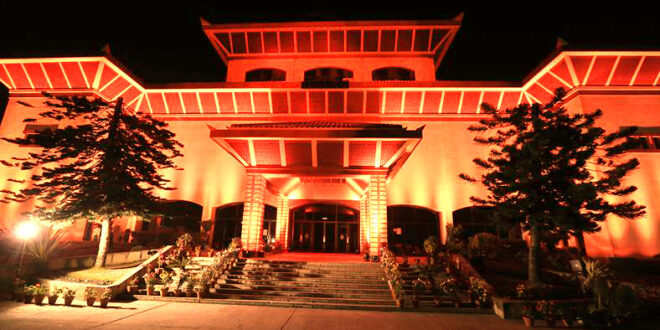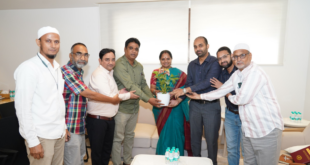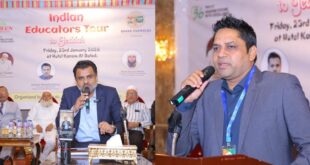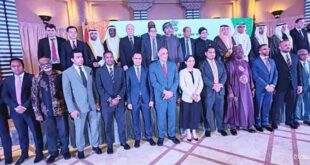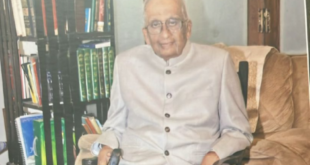By: Asad Mirza
A universal truth is that there are no permanent enemies and friends in politics, only ensuring your interests, supremacy and continuing in office guides you breaking or forming alliances across the democratic world. But the Nepali politics gives a completely new meaning to horse-trading or coalition politics, just to be in power.
Veteran communist politician KP Sharma Oli was sworn in as Nepal’s latest prime minister on Monday 15 July 2024, the fifth time in five years, hoping to ensure political stability in the impoverished Himalayan nation that badly needs to resurrect its economy by wooing investors and creating new jobs.
Oli, who heads the moderate Communist Party of Nepal (Unified Marxist Leninist), was administered the oath of office by President Ramchandra Paudel, three days after his predecessor Pushpa Kamal Dahal lost a parliamentary vote of confidence.
Oli announced a 22-member cabinet, with Bishnu Paudel picked as finance minister, and Arzu Rana Deuba of coalition partner Nepali Congress (NC) named foreign minister. Deuba is the wife of the NC president and former prime minister Sher Bahadur Deuba.
On Monday, Indian Prime Minister Narendra Modi congratulated Oli and said he looked “forward to working closely to further strengthen the deep bonds of friendship between our two countries and to further expand our mutually beneficial cooperation for the progress and prosperity of our peoples”.
Nepal has been politically unstable since it abolished a 239-year-old monarchy in 2008. Oli’s new government will be the 14th since, with 72-year-old Oli himself returning for his fourth term.
Dahal was forced to prove his majority for the fifth time during a tumultuous 20-month tenure after UML withdrew support to his Communist Party of Nepal (Maoist Center) and formed a new alliance with NC, the largest party in parliament.
UML leaders said the new alliance was needed to ensure political stability but have not elaborated on that. Nepal is one of the world’s poorest countries and political instability has discouraged investment and hobbled its economic development, forcing millions of young people to seek work mainly in Malaysia, South Korea and the Middle East.
The instability has also sparked sporadic protests with people demanding the restoration of the monarchy saying successive governments had failed to live up to commitments to develop the country sandwiched between India and China.
Political developments in Kathmandu are watched closely by rivals New Delhi and Beijing that pour development aid and infrastructure investment into Nepal and jostle for geopolitical influence.
Oli took Nepal closer to China by signing a transit agreement with Beijing in his first term in 2015-2016, ending India’s monopoly over landlocked Nepal’s foreign trade.
However, it seems that NC and UML, Nepal’s two biggest parties, had taken a risk by pulling down Dahal’s government and forming a new alliance.
If this coalition government also fails to deliver governance and political stability, the Nepali people may interpret it as the failure of the constitution and the system.
Ever since Nepal transitioned from an absolute monarchy to a constitutional one in 1990, and then to a full-fledged republic in 2008, its democratic polity has been marked by instability and constant changes in power, leading to poor governance. Despite the institution of constitutional reforms related to federalism and guaranteed representation for marginalised forces following a civil war and the overthrow of the monarchy, the outcomes have been a perpetuation of the country’s status as a “least developed country”.
It is quite evident that the leadership of the three major parties have shown more interest in sticking to power by any means irrespective of whether they are driven by pre-poll coalitions or not. Besides, the inherent instability in a parliamentary system that reflects social fissures in the country has led to a form of coalition politics that is driven less by ideological or principled considerations and more by a hankering towards power.
Such instability and an unprincipled pursuit of power will only result in more disillusionment among the Nepali people with the democratic process. Nepal can perhaps be better off with a presidential system that allows for a directly elected head of state.
Once a rice exporter, Nepal now depends on food grain imports, and the cement industry, one of the prime employers in the country, is running at 30 percent capacity. The World Bank estimates that the country’s economic growth is not likely to exceed 4 percent in the current fiscal and the IMF has warned Nepal of a financial crisis if steps are not taken to improve the economy.
The developments in Kathmandu, will be watched with caution by New Delhi. While Prachanda enjoyed goodwill in India, Oli’s hardline stance during the border blockade of 2015, his pro-China position, and moves to include disputed territories in Nepal’s map have not gone down well with South Block.
The Chinese footprint in Nepal is growing. However, India continues to be Nepal’s largest trading partner and about eight million Nepalese citizens live and work in India. New Delhi would, therefore, do well to take a nuanced position on the politics in the Himalayan nation and ensure that Beijing does not use the latest political turn in Kathmandu to its advantage.
(Asad Mirza is a Delhi-based senior political and international affairs commentator.)
 Gawah (The Witness) – Hyderabad India Fearless By Birth, Pristine by Choice – First National Urdu Weekly From South India – Latest News, Breaking News, Special Stories, Interviews, Islamic, World, India, National News
Gawah (The Witness) – Hyderabad India Fearless By Birth, Pristine by Choice – First National Urdu Weekly From South India – Latest News, Breaking News, Special Stories, Interviews, Islamic, World, India, National News

